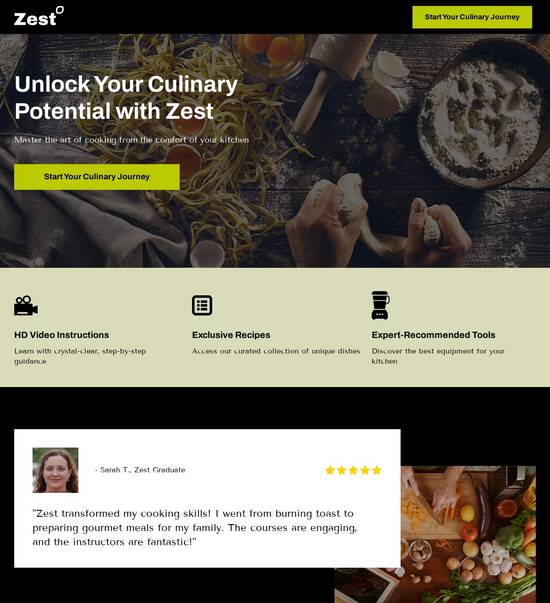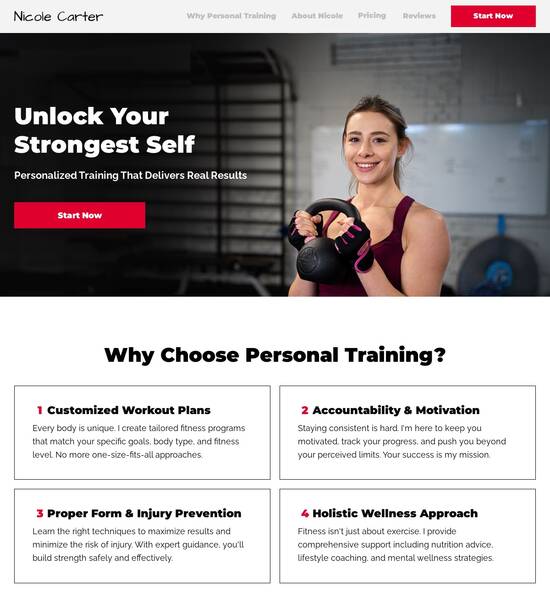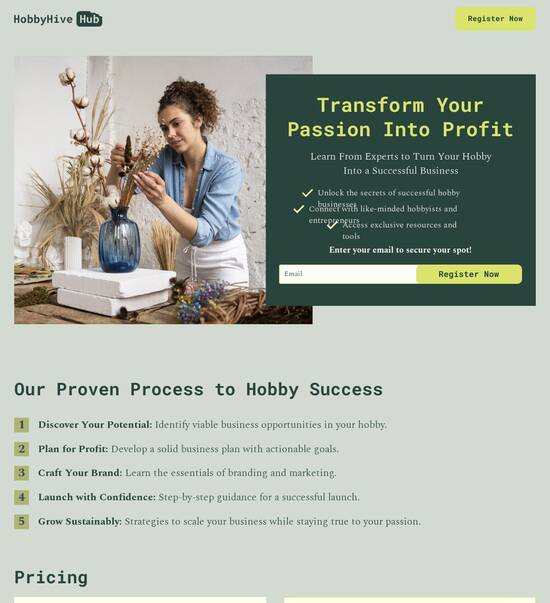
Material design onboarding page templates
Use TemplateAbout template
Use material design onboarding page templates and stay true to your brand identity. Resonate with your audience today.
Recommended templates

Easy to build without coding
With the intuitive drag-and-drop builder, anyone on your team can create high-converting pages without any knowledge of code or design. Make enhancements to your landing page with custom widgets using Javascript, HTML/CSS, or third-party scripts.

Multiple layouts for any industry and goal
Select from 500+ landing page layouts built to boost conversions across industry-specific scenarios. Customize them by adjusting fonts, adding images, and generating on-brand content with the AI assistant. Quickly scale with Instablocks® and Global Blocks that you can save, reuse, and update globally.

Loads fast and looks polished on any device
Every template is responsive, which means they present professionally on any device and load blazingly fast with our Thor Render Engine. You can also power them up with Google AMP technology to deliver an unparalleled mobile experience and drive higher conversions.

Robust analytics & experimentation
Get real-time updates and reporting across all your devices, showing the number of visitors, conversions, cost-per-visitor, and cost-per-lead. Launch AI-powered experiments, run A/B tests, and use heatmaps to analyze user behavior, then optimize your landing page to maximize conversions.







Easy to build without coding
With the intuitive drag-and-drop builder, anyone on your team can create high-converting pages without any knowledge of code or design. Make enhancements to your landing page with custom widgets using Javascript, HTML/CSS, or third-party scripts.
Multiple layouts for any industry and goal
Select from 500+ landing page layouts built to boost conversions across industry-specific scenarios. Customize them by adjusting fonts, adding images, and generating on-brand content with the AI assistant. Quickly scale with Instablocks® and Global Blocks that you can save, reuse, and update globally.
Loads fast and looks polished on any device
Every template is responsive, which means they present professionally on any device and load blazingly fast with our Thor Render Engine.
Robust analytics & experimentation
Get real-time updates and reporting across all your devices, showing the number of visitors, conversions, cost-per-visitor, and cost-per-lead. Launch AI-powered experiments, run A/B tests, and use heatmaps to analyze user behavior, then optimize your landing page to maximize conversions.
All the features you need to build lead-generating landing pages
Explore more featuresLearn how to build top-performing landing pages for any goal
FAQs
Leading the way in building high-performing landing pages





Maximize your ROI with Instapage's powerful landing page creation tools
Optimizing your digital marketing campaigns is essential for business success, especially in the competitive landscape of the USA. Instapage's landing page and CRO platform empower marketers to accelerate results, enhance campaign effectiveness, and ultimately maximize ROI. This step-by-step guide will help you navigate the features of Instapage to create high-converting landing pages tailored to your target audience in various sectors such as business services, tech, education, and more.
Understanding the importance of landing pages
Landing pages are crucial digital touchpoints designed to capture leads and drive conversions. A well-crafted landing page motivates visitors to take specific actions aligned with your marketing goals. With Instapage, you gain access to a library of over 100 customizable, conversion-focused templates that help streamline this process.
- Customizable templates facilitate quicker deployment, enhancing efficiency.
- High-converting elements are strategically designed to boost engagement.
- The intuitive page builder allows for acts of creativity without needing coding knowledge.
Kickstart your campaign with ready-to-use templates
Choose from Instapage's extensive collection of high-converting templates to jumpstart your campaign. This enables rapid page creation without compromising on quality. Tailor these templates to fit your unique brand identity and messaging.
Optimizing pages for successful conversions
Enhancing your landing pages is essential for achieving desired outcomes. Instapage provides built-in A/B testing, heatmaps, and an analytics dashboard for comprehensive performance assessment.
- A/B testing allows you to compare different versions of your pages to find what resonates best with your audience.
- Heatmaps offer insights on user behavior and interactions, helping you refine your content.
- The analytics dashboard tracks key metrics, enabling effective data-driven decisions.
Delivering personalized experiences
With Instapage, personalizing content for different audience segments is seamless. This includes dynamic text replacement and customized ad alignments, which ensure your messages are relevant and engaging.
- Dynamic text replacement enables individualized messaging based on visitor data.
- AdMaps align specific ads with tailored landing pages to improve relevancy and conversion likelihood.
- Audience-level tracking helps refine targeting strategies for improved ROI.
Arming your marketing strategy with personalized landing pages fosters connections with your audience, leading to improved engagement.
Ready to boost your marketing ROI with high-converting landing pages? Start your free trial today and explore how Instapage can transform your campaign strategy!
Unpacking the dynamics of Material Design onboarding page templates
The essence of Material Design in user onboarding
Material Design is a design language developed by Google in 2014, focusing on creating a unified cross-platform experience. Its foundation lies in the concept of material as a metaphor, which mimics physical materials in a digital context. By leveraging concepts such as light, surface, and motion, designers are able to create experiences that feel familiar and intuitive to users.
The key principles of Material Design include elevation, which emphasizes the layering of elements to create depth, making navigation more accessible. Motion, too, plays a significant role—animations guide users through interactions. Responsive animations ensure that the transition between different elements feels natural and engaging.
Material Design is particularly crucial for onboarding because it enhances user engagement through intuitive layouts. When new users encounter an onboarding page that employs Material Design, they are likely to feel more comfortable navigating the interface. This visual appeal translates to higher user retention and satisfaction as the principles encourage simplicity and a user-centric experience.
Crafting your onboarding experience: The role of templates
An onboarding page template is a pre-designed layout that serves to guide new users through an application or website's primary features. Its purpose is to simplify the onboarding process by providing a structured introduction that highlights the essential functionalities of the product.
Using a Material Design onboarding page template has several advantages. Firstly, it ensures consistency in design across various platforms, which is vital for maintaining brand integrity. Secondly, these templates streamline the development process, saving both time and resources that would otherwise be spent on designing from scratch. Lastly, a well-thought-out onboarding template enhances user experience by incorporating pre-defined layouts that emphasize clarity and usability.
Key features of Material Design onboarding templates
One significant feature of Material Design onboarding templates is the bottom tab bar functionality. This design element allows users to navigate easily among different sections of an application or website. By utilizing a bottom tab bar, users can access multiple areas of the platform quickly, enhancing overall accessibility.
Another vital component is ViewPager integration, which offers smooth transitions and swiping functionality that keeps users engaged. By enabling users to swipe through content, it creates a more interactive onboarding experience. Rich previews for content consumption also feature prominently in these templates, allowing users to visually explore functionalities before committing to using the application.
Moreover, customizable elements in these templates empower businesses to align their onboarding experience with their brand identity. Options for adjusting color schemes, fonts, and layouts ensure that companies can maintain a cohesive brand voice while delivering tailored experiences.
Designing with user communities in mind
To create a compelling onboarding experience, it's essential to understand your target audience. Engaging with user communities through Q&A sessions and feedback forms can provide valuable insights into their preferences. This understanding allows designers to tailor content that resonates with users, making onboarding more effective.
Leveraging collective knowledge in template development promotes inclusivity in design. Designers can engage with design communities for inspiration and best practices, fostering collaboration that refines onboarding experiences. This communal effort ultimately leads to a more inclusive and empathetic onboarding process that contributes positively to user experience.
The technological backbone of effective onboarding
Integrating cutting-edge technologies is vital for the success of Material Design onboarding templates. Utilizing responsive design ensures that the onboarding experience adjusts seamlessly across various devices. This responsiveness is crucial as mobile usage continues to rise, and users expect a consistent experience regardless of their device.
Popular frameworks like Flutter and React Native are widely adopted for developing Material Design components. These frameworks allow developers to create cross-platform applications efficiently, providing a unified onboarding experience that bridges the gap between desktop and mobile interfaces. The integration of such technologies ensures templates are built to enhance usability while reflecting the modern expectations of users.
Exploring user-centric content strategies
Content plays a pivotal role in the onboarding process. Crafting messages that communicate the platform's value clearly and concisely is crucial for new users. It's essential to identify core functionalities that should be highlighted, ensuring that users understand what sets the application apart and how it meets their needs.
Tailoring onboarding messages for diverse user personas enhances engagement. Incorporating multimedia elements, such as videos and interactive graphics, can also make the onboarding process more immersive. Providing content that resonates with different audiences fosters a positive impression, encouraging users to explore the platform further.
Teams and tools: Collaborating for success
Successful onboarding design often stems from cross-functional team dynamics. Collaboration between designers, developers, and marketing teams is essential to ensure that each aspect of the onboarding process aligns with user expectations. Defining clear roles and responsibilities helps streamline the workflow, resulting in a polished final product.
Essential tools such as Figma and Sketch are widely used for developing onboarding templates. These design tools allow teams to create, iterate, and prototype designs effectively. By utilizing prototyping tools, teams can gather feedback early in the design process, promoting continuous improvement and ensuring that the onboarding pages serve their intended purpose efficiently.
Measuring success: Analytics and feedback loops
To gauge the effectiveness of onboarding pages, it is crucial to collect data on user engagement. Metrics such as completion rates, time spent on onboarding, and user retention provide valuable insights into the onboarding experience's effectiveness. Implementing user feedback mechanisms, such as surveys or in-app prompts, can also highlight areas for improvement.
Conducting A/B testing further enhances the onboarding experience. By comparing different versions of onboarding pages, teams can identify which elements resonate most with users. Implementing changes based on data-driven insights guarantees a strategic approach to optimizing onboarding, ensuring that users receive the best possible introduction to the platform.
Considering future innovations in onboarding pages
Anticipating user needs and staying ahead of trends is pivotal for effective onboarding. Emerging trends in user onboarding such as gamification and interactive tutorials have shown promise in improving user experiences. Innovations in technology will shape how users interact with onboarding processes, and businesses must be adaptable to these changes.
Machine learning has emerged as a game-changer in creating personalized onboarding experiences. By analyzing user data, AI can help tailor introductory content to meet individual user needs and preferences. Predictive analytics provide insights that enhance user journeys, ensuring that onboarding remains relevant and engaging well into the future.
Conclusion reflection: Transformative power of onboarding templates
The long-term benefits of well-designed onboarding pages cannot be overstated. A thoughtful onboarding process is instrumental in building a loyal user base and positioning platforms for sustainable growth. As users become more engaged, their satisfaction will reflect positively on brand loyalty and overall success.
In closing, the significance of Material Design extends beyond aesthetics; it plays a crucial role in shaping users' experiences. As design principles evolve, forward-thinking businesses should remain open to innovative approaches for user engagement, ultimately fostering a user experience that aligns with technology's advancements and users' expectations.
Ready to skyrocket conversions?
Supercharge your ad campaigns with high-performing landing pages
Get started














